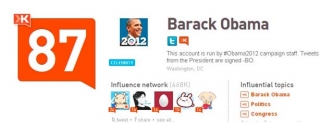Klout scores are one of the best-known social media ranking tools. The definition of Klout gets a lot of scorn, because it is so obviously not an accurate indicator of influence (I hope):


So, no. Klout scores are just one measurement of how fluent a given individual is in communicating via social media about things that interest people who use social media. To date, it has been heavily dependent on Twitter fluency. One might expect that a medium of 140 characters where spelling and grammar are mercilessly shredded might produce the above result.
Low Klout scores do not automatically mean someone is not a good social media consultant for your brand. It most certainly does not mean that someone is a poor influencer within the building and design communities. Our industry is not huge in the overall scheme of social media, which is dominated by celebrities and entertainment-related chat.
One benefit of Klout is that it helps illustrate why a social media investment is only worth it if your plan includes engagement, not just gaining more followers and fans. Klout measures interaction, not just raw numbers. In that way, Klout, as well as Peer Index, EdgeRank Checker and similar reporting tools are valuable in educating senior management that social media is an investment in relationships, not an arms race for followers. In my experience, good Klout scores in the building and design industry is any score higher than 30.
How Do Klout Scores Work?
Like Google and other search engines, Klout is an ever-evolving, highly-secretive algorithm. Which is why we wrote the headline as we did.
Klout describes its 1-100 score as measuring “influence based on your ability to drive action.” Note that “action” is not defined as driving a sale or visiting a website. That’s not how relationships work, although it may lead to such action, just as you rely on friends and family recommendations for many purchases. There are three basic components to the Klout algorithm:
True Reach: Total followers impact this measure, but in the context of how many of your followers are really engaging with you over time, based on conversations and retweets. It’ s not just about total followers.
Amplification: This measure dives deeper into how often your content is shared or discussed and by whom.
Network: This measure looks at the influence of your followers, taking into account their own True Reach and Amplification. This is the measure that keeps a lid on scores within the building and design industry. Few of us are in daily conversations with Ashton Kutcher or Justin Bieber. Few of us want to be.
In response to a considerable outcry among users, Klout is also working to remove volatility in the score that has come from lower use during weekends and vacations, also known as a having a life. (Check out this great post from a BlogHer member, Dear @Klout, Here’s What I Was Doing This Weekend.)
In summary, Klout scores are a measure, but not the measure, of influence on social media. Using Klout scores by themselves, such as the brands and agencies profiled in last Friday’s New York Times Klout story, is basically lazy. It would be like using CPM as the only determination of your ad spend, vs. digging into the audience and understanding the influence of a given media outlet.
Because humans are involved, understanding true influence is not likely to ever be determined by an algorithm.
Nora, I think you did a wonderful job on this. My personal problem with things like this is that they are strictly based on numbers and true interaction can’t be quantified in that way. I may post some very personal message to someone, which in turn deeply effects their thinking or such. They can’t measure that. Or when I man I have never met sends me a large letter offering to help and gives me a plan of action to do so.
So I totally agree- they are a measure but not the total measure and people need to realize that. The most important thing is the true interactions that happen, not how many or few times but the meaning of the messages sent.
It can be looked at as a tool, a guide, a reference but not the final judgement of our dealings with others. That can’t be rated as far as I know. It’s personal.
The word “trust” is all-important in social media relationships, just as in real life! Can I drive “action” with a high score? Sure. But I care more about being trusted. I would want a company (or PR firm) to hire me to represent them based on them trusting me, my friends/fans trusting me and me trusting the company/brand. Your reputation is so much more important than a fluctuating score. What’s that they say about tools? - Their use depends on the user! Very well done post.
Thank you, Todd and Alexandra. Everyone knows we tend to buy things recommended by our friends and family. Everyone also knows we buy things/services from people we like and trust. No one needs a score to prove this. I think the fixation on scores is related to ongoing misconceptions about social media being another marketing tactic, vs.a way to power-up connections that lead to authentic recommendations.